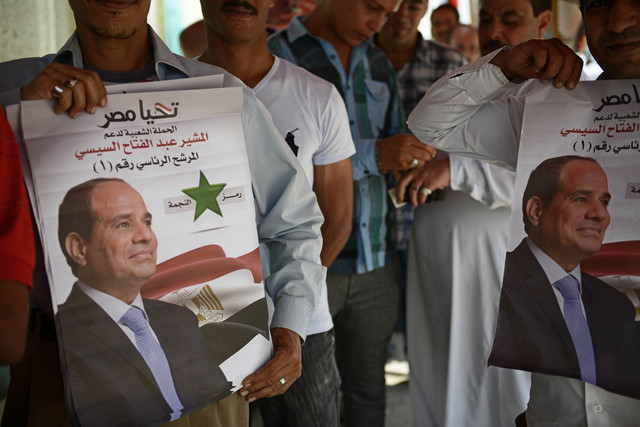The Egyptian Embassy’s Open Letter to the ‘Washington Post’

In the aftermath of Egypt’s first presidential elections since last year’s “coupvolution” that ousted Muslim Brotherhood leader Mohammed Morsi from office, the Washington Post‘s editorial board published a brief, scathing criticism of president-elect Gen. Abdel Fattah el-Sisi and what it called Egypt’s “failed elections”.
“The relentless propaganda by the regime of Gen. Abdel Fatah al-Sissi, which claimed he enjoyed overwhelming support from an adoring population, was proved false,” the editorial read.
“The election is one more sign that Gen. Sissi lacks the means or the mandate to deliver on [U.S. security] interests,” it continued – those “interests” including Israel and terrorism.
Last week, Egypt’s ambassador to the U.S., Mohamed Tawfik issued a response to the editorial.
To the Editor,
The false characterization in the May 29 editorial “General discontent” of Egypt’s presidential election this week as “failed” reveals a deep lack of understanding of Egypt’s complex and ongoing political transition. Since 2011, our country has experienced two revolutions and defeated a failed experiment with a model of governance that was rejected by millions of Egyptians. Throughout, we have been battling an increasingly sophisticated and determined terror network. Just in the last 11 months, Egypt has successfully drafted and passed a new Constitution that meets international human rights and civil liberties standards, and has held internationally-monitored presidential elections.
We are the first to admit that Egypt’s path to democracy is not yet perfect, but we are determined to get there. It is easy to cast stones on our fledgling democracy from some in the US, whose Constitution, political systems and human rights standards took generations to develop. What is hard, apparently, is nuanced understanding of our country’s internal dynamics, history, and role in regional and global trade and security and the long trajectory any democratic transition requires.
Your newspaper has opted for the easy road again and again. Your claim that voter turnout was low is totally unfounded. Your whole assessment is based on this fabrication. Rather than wait for the official results and the reports of election observers, you chose to pre-empt any objective discourse. In fact, presidential candidate “Hamdeen Sabahi”, whom you chose to misquote, conceded that, irrespective of various assertions of irregularities, the will of the Egyptian people is beyond doubt. Your hyperbolic rhetoric no doubt helps keep you in business, but does a disservice to those who seek greater understanding about our world.
Mohamed Tawfik, Egyptian Ambassador to the United States
While the letter from Tawfik, a remnant of the pre-revolutionary regime, is itself guilty of “hyperbolic rhetoric”, he’s right that The Post‘s editorial, titled “Egypt’s military ruler suffers an embarrassment at the polls”, lacks any sort of nuance.
But what can you expect from a publication known for its conservative stance and that, according to its policy for “The Post’s View” pieces, never consults on-the-ground reporters in editorial board discussions?
The Washington Posts‘s conclusion: “If the Obama administration ignores warning signs like this week’s election flop, sooner or later it will find itself hanging onto another weak and despised Arab dictator — and calculating the damage to Mr. Obama’s ‘security interests.'”
In the end, The Post‘s short written attack on Sisi was a thinly veiled attack on Obama for his support of the new Egyptian leader. They would have trashed the elections regardless of whose face and name has been plastered all over Egypt’s streets.
WE SAID THIS: Thoughts?
